Ceramics is a versatile and durable material mainly made up of inorganic, metallic compounds like clay, silica, and feldspar. These materials are shaped and then processed at high temperatures to create rigid, heat-resistant products. Ceramic has a high compression capability, great thermal resistance, and electrical insulation. It has traditionally been used in semiconductors, medical devices, tiles, and kitchenware. One of the main negatives about ceramics is that they are brittle and prone to fracture under stress which is important to select the best adhesive for ceramics so you can repair them when needed.
Criteria for Selection
Ceramics are brittle and non-porous so unique consideration is required to determine the best adhesive for them. Below we consider several factors in defining the criteria for selecting the best glue:
1. Adhesion Strength
The ideal adhesive will provide sufficient strength and the ability to penetrate microscopic irregularities to form a strong mechanical or chemical bond. This means the adhesive must have a high tensile strength.
2. Compatibility with Ceramic Material
Generally, the best adhesive is the one that bonds with dissimilar materials so you can glue ceramic to metal, wood, or plastic. Additionally, adhesives designed specifically for ceramics are preferable to those that are not. It is also suggested that the adhesive formulation be compatible with glazed and unglazed surfaces. A ceramic glaze is a glassy coating on the surface of ceramics.
3. Curing Time
The adhesive’s curing time is an essential consideration. Fast-curing adhesives are good for quick repairs but provide less time for readjustments and precise alignment. Likewise, a slow-curing adhesive is better for intricate or large repairs requiring precision alignment.
4. Water and Heat Resistance
Ceramics are often situated in environments where there is significant exposure to heat or water such as kitchenware, bathroom tiles, and outdoor decorations. The adhesive must be able to withstand these conditions without losing bond strength. Therefore, its suggested to look for a waterproof or heat resistant glue.
5. Flexibility and Impact Resistance
Ceramics are prone to experiencing thermal expansion or minor impacts during use. A flexible adhesive can withstand these movements without cracking.
6. Non Toxicity and Food Safety
If you will be repairing ceramic kitchenware, you must select an adhesive that is non-toxic and food-safe. Several industrial adhesives contain chemicals that are not suitable for food and drink items. Some adhesives emit strong odors or harmful volatile organic compounds. Therefore, it may be best to choose an adhesive with a low volatile compound (VOC) level.
7. Ease of Application
Ease of usability is a key consideration in the selection of an adhesive. Some glues come with precision applicator bottles for small cracks while others require pre-mixing of resin and hardener solutions.
8. Bond Appearance
The aesthetic quality of a repair is pivotal for ceramic items like vases or decorative platers. Clear drying glues are preferable to opaque drying ones unless a transparent finish is not mandatory.
9. Chemical Resistance
Ceramics that meet chemicals such as those found in household cleaners require glue that can withstand exposure to degradation.
10. Longevity
The long-term durability of a bond is essential. The glue should ideally be able to resist wear and tear and environmental degradation from factors such as UV rays and moisture.
11. Repair Type
Depending on the type of repair you intend to perform you will want to select an adhesive accordingly. For example, cyanoacrylate (super glue) is suitable for small cracks or chips. Large breaks are better dealt with using epoxy which provides a stronger bond. Higher-stress applications are best handled with a two-part epoxy or polyurethane glue for maximum durability.
12. Cost and Availability.
Cost is a key consideration if you are on a budget. However, if you need a strong and durable bond, you may need to invest in a higher-quality adhesive to get the best results.
5 Best Glues for Ceramics
Now that we have defined the criteria for selection, we recommend 5 best glues for ceramics.
Gorilla Super Glue Gel
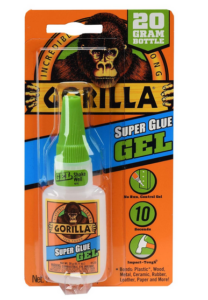
Gorilla Super Glue Gel is a top selection for small to medium ceramic repairs because of its ease of usability, fast curing time, and strong bond. It has a gel-like consistency which makes it suitable for vertical surfaces and precise applications without posing a risk of dripping or forming a mess. The adhesive works well on non-porous surfaces so its suitable for broken pottery, decorative ceramics, and small household items.
It is not entirely waterproof but is water-resistant so it’s suitable for indoor use. It dries in 10-45 seconds and dries transparent clear.
J-B Weld ClearWeld Epoxy
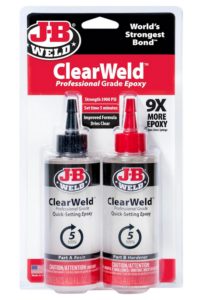
The JB Weld ClearWeld Epoxy adhesive offers exceptional strength and durability with its 3900 PSI tensile strength. It can withstand heavy use and stress, making it ideal for industrial-grade applications. It sets in 5 minutes and cures fully in 1 hour. It is water-resistant when cured and can tolerate moderate heat exposure. Also, it dries clear, so it offers a visually aesthetic professional finish. It is suitable for large or intricate ceramic repairs. It does require mixing which may be less convenient for some folks.
Loctite Super Glue Liquid Professional
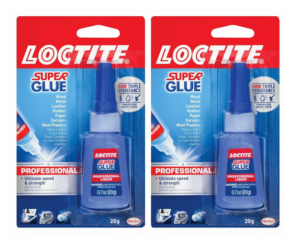
Loctite Super Glue Liquid Professional is a cyanoacrylate adhesive regarded for its superior bonding strength. It works effectively on non-porous surfaces like ceramics and offers a long-lasting bond. It comes in a squeeze bottle for precision application making it suitable for small or detailed fixes. It does offer limited water resistance so its ideally suitable for indoor use. It dries clear, offering a transparent finish. This adhesive is not recommended for outdoor, or high moisture environments or applications where there is heavy stress or high impact.
E6000 Craft Adhesive
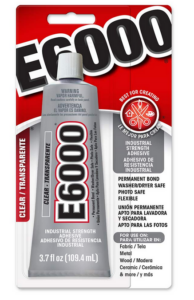
The E6000 Craft Adhesive is a versatile and flexible glue that is capable of bonding ceramics effectively. It offers a strong, impact-resistant bond that offers slight flexibility upon curing. It is very water resistant, making it suitable for outdoor use. It is also resistant to cleaning agents and solvents so it’s suitable for kitchen tiles. It sets within 24 hours and cures within 72 hours with a clear transparent finish. It may produce a strong odor during application so ensure you have the correct ventilation gear ready.
PC-Clear Epoxy Adhesive
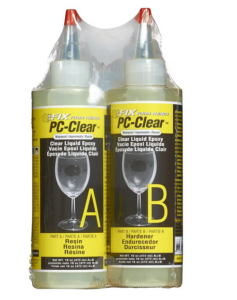
PC-Clear is a two-part epoxy adhesive designed for transparent bonding. It is a good choice for functional and decorative ceramic items such as kitchenware. It offers a strong and durable bond and can effectively bond with dissimilar items. It is fully waterproof when cured, a process that takes 24 hours to complete.
Conclusion
Those are the top 5 recommendations for the best glues for ceramics. If you find a different adhesive you want to investigate, you should consider comparing it with our list of selection criteria to ensure it is the right fit. Alternatively, you can leave a comment for our opinion below. Overall, for small cracks or chips, Gorilla Super Glue and Loctite Super Glue are ideal options. If your ceramic item will be exposed to water or heat, E6000 or PC-Clear are the possible solutions. If you find this article useful, let us know in the comments or like us through the social media buttons.